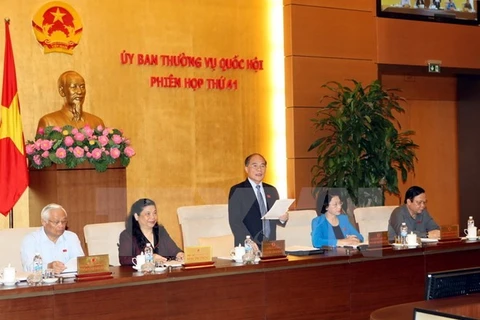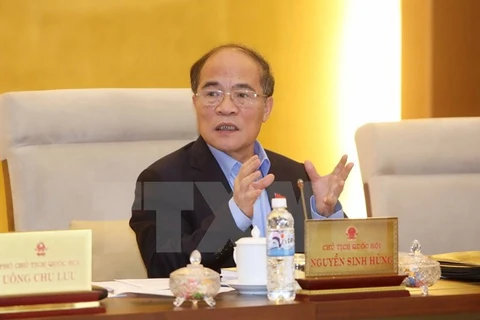 Customers at a transaction desk of a branch of VietinBank in Quang Ninh province's Ha Long City. NA deputies voiced their concern over the proposed changes to the value added tax law and tax administration law in Hanoi on October 16. (Source: VNA)
Customers at a transaction desk of a branch of VietinBank in Quang Ninh province's Ha Long City. NA deputies voiced their concern over the proposed changes to the value added tax law and tax administration law in Hanoi on October 16. (Source: VNA) Lawmakers on the last day of the 42nd National Assembly Standing Committee on October 16 agreed that unlawful residency registration and marriage registration would no longer be punishable under the penal code.
On the discussion about the revised Penal Code, most of NA deputies said that it was necessary to review and eliminate some crimes as they did not cause serious consequences. Administrative provision was appropriate in these cases.
Giving opinion on the application of death penalty for elderly people, Chairman of the NA Law Committee Phan Trung Ly said he agreed with the revised law, which would not implement the death penalty for those who were more than 75 years old. This represented a humane policy of the State.
Discussing the death penalty further, some raised their voices to support the removal of seven charges, including robbery, damage of buildings important to national security, disobeying against orders, surrender to the enemy, sabotaging the peace, crimes against humanity and war crimes.
However, NA Vice Chairman Uong Chu Luu said that crimes against humanity and war crimes should not be removed although they had not yet occurred.
The majority of NA deputies strongly affirmed that it was vital to retain the death penalty for corruption crimes. Those who were guilty of embezzlement could be free from death penalty when they actively compensate for the consequences of the crimes they had committed and cooperated with the authorities' investigation.
Also in the morning, the NA deputies discussed the revised Civil Procedure Code. Most agreed with the law, which stipulated that the courts could not refuse requests to resolve civil cases just because there were no laws available to apply to these cases.
They also suggested that the law should be rewritten in a more persuasive way.
Regarding procedures of sending and receiving petitions, many members suggested electronic mail should be added among many forms of petition to the judicial agencies to ensure convenience for petitioners.
The National Assembly's Standing Committee discussed the country's tax law and tax administration law as well as the preparation for the National Target Programme in the periods of 2016-2020 during the last session of its 42th meeting, which concluded in Hanoi on October 16.
NA deputies stressed the improvements of Vietnam's tax law to facilitate the country's global integration, development and to honour international agreements and protocols which are a part of or currently in negotiation.
NA deputies voiced their concern over the proposed changes to the value added tax law and tax administration law, which were set to take effect on January 1 this year and the law on special consumption tax, which would take effect next year.
Head of NA's Legal Committee Phan Trung Ly said that tax regulations must remain a stable factor to ensure the trust and confidence of the public and the business sector.
Chairman of the NA Nguyen Sinh Hung asked Government agencies to prepare detailed reports on necessary changes to be submitted and presented to the NA for approval with focus on the impact on Vietnam being a part of the Trans Pacific Partnership (TPP) free trade agreement.-VNA
























